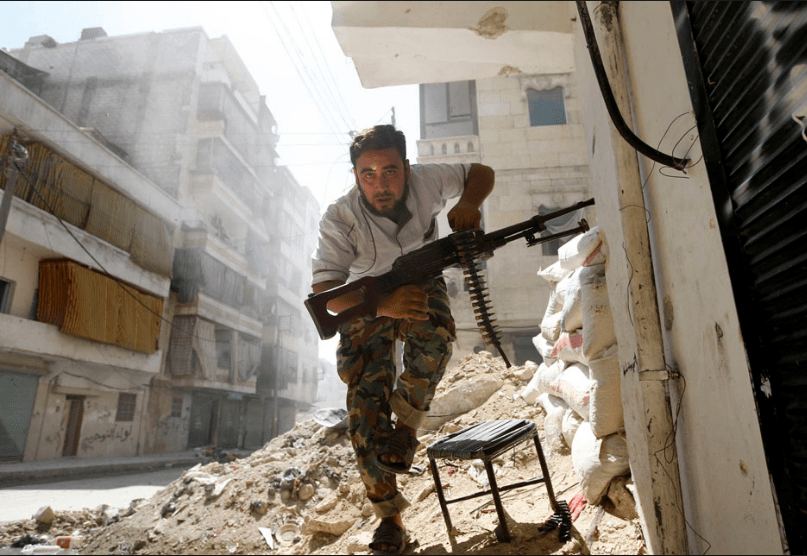This post is also available in:
![]() العربية
العربية
The majority of the youth in Deir Ezzor had never known what weaponry was like before the Syrian revolution broke out. Among them were university students who had not joined any military academy belonging to the Assad-regime to be familiar with weaponry in the first place. There were the teachers who knew nothing but the gifts they had to offer to the military branches in their region to be exempted from the military duties entrusted to them.
The revolution for them was like a mother who only wanted to have her rights. Seeking her freedom, dignity and appealing to what is left of the conscience of the sons of her country. Her children could not remain silent while their mother was under attack, forcing them to take up arms, despite the fact that they were unfamiliar with them. It was not a reason for them to sit down and watch the mother suffering and grieving. They stood up and took everything available at the time; bet it a gun or a Molotov. They carried arms to protect their legitimate right in the revolution. Such a moment was etched in the memory of Deir Ezzor when Assad security forces raided several civilian homes in Al-Jabliyah neighborhood, harassing several women. I was returning to the province from Damascus when the incident occurred, I remember that I took a rest in Palmyra.
We were coming from Damascus to Deir Ezzor when the reports of the people of Deir Ezzor taking it to the streets rocked the region. The other passengers started to wonder and question the situation, trying to grasp what was taking place. The bus was dominated by silence; the only thing that made a noise was the notifications of the updates on the situation of Deir Ezzor every passenger would receive on his or her phone.
At 10 pm, we reached Deir Ezzor to realize that it had already become so much different to Deir Ezzor we had known and lived in before. I was overwhelmed by the feeling of dreariness after getting off the bus. People were walking in the streets, which were not crowded as they used to. I arrived to my house while I still questioning the situation, trying to understand what was it about. My mother welcomed me as always, however, I only spent few minutes with her, until I heard the slogans and Takbeer of the people rocking my neighborhood. I rushed to the street to know what was going on, as my mother was attempting to prevent me from doing so.
“What is the story?” I asked, then the youth answered my by saying that they received a report of the killing of Jamee Jamee, causing me to shout “Allahu Akbar” unconsciously. The killing of Jamee Jamee is a victory for the revolution and a slap in the face of the regime. Less than an hour after the report spread, sounds of gunfire was heard coming from everywhere. The regime deployed the army to attack Kanamat neighborhood, which was met by an armed resistance by only seven rebels.
We spent two nights making duaa for our seven brothers and in the morning that followed, we began preparing for a huge protest, which started in mosques and headed to the public park. We had no weaponry at the moment and we used Molotov as an alternative, with some other rebels supporting us by their hunting guns. Mosques were rocked by Takbeer. The atmosphere was strange for us following tension and the fear of the unknown dominating us at the time. The regime tanks began to shell Othman Mosque intensively, which was a symbol of the revolution in Deir Ezzor. It was also the first aggression against mosques in the history of the revolution, causing us to lose hope in the army, which we had thought they would awake and stood by us. The aggression against Deir Ezzor ignited the lit that would later start a bloody war against the regime later.
After a short while following the events, the army of the Assad-regime managed to capture key areas in the city of Deir Ezzor. The tanks and military vehicles kept patrolling the streets of the city, ready to suppress any voice calling for freedom and dignity.
Despite the siege that was imposed on our movements within the streets and neighborhoods of Deir Ezzor, the protests returned to them gradually. Once again, the slogans of freedom returned to pierce the silence of the oppressive weaponry. We would take it to the streets, armed by nothing but our slogans that resonated with our inner pains. The response to this was violence and aggression, which caused many protests to rise as martyrs. Then, we would held massive funeral for them and the regime forces would target us with different types of weaponry, leading to the martyrdom of more martyrs in funeral held for martyrs.
Our faith was stronger than their bullets, which made us stay firm on our revolutionary path to the death.
The situation continued to get worse as the regime carried on butchering civilians who showed any sign of dissidence. During a Friday a friend of mined called me on my phone and informed me that a protest would be held after Ishaa prayer. After the prayer, I headed to Ghassan Aboud roundabout, which was the place where the protest was arranged. Once we gathered in huge crowds at the roundabout, we began shouting “ Deir Ezzor, Deir Ezzor” “Freedom, Freedom”. After ten minutes, I saw eight masked young men carrying weaponry, Kalashnikovs, RPG and AK47; they headed towards the protest and stopped near it, preparing to target anyone who would crack down on the peaceful protest. The surprise, which was drawn on the faces of the youth, was the dominant scene. Thus, the spark of the Free Syrian Army was lit in the province of Deir Ezzor.










